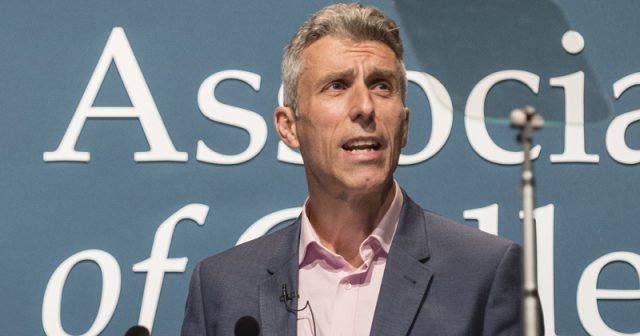It has been another positive week for new apprenticeship providers, with many scoring encouraging results in their early monitoring visits from Ofsted, while a university technical college was rated ‘good’ in its first inspection.
The only poor report came in for Bishop Auckland College which fell from a grade two to a three.
UTC South Durham, which opened in 2016, received grade twos across the board.
Ofsted reported that learners attained “above-average” standards in vocational subjects, and last year over half of the 80 learners on 16-19 programmes secured places on apprenticeships and two-thirds went into STEM-related careers when they left.
Brooke House Sixth Form College made good progress in its latest monitoring visit, making ‘significant progress’ in two out of three areas after receiving a grade three last year.
A new principal and senior management team have been appointed, the latter of which has established a long-term financial plan for the college.
Employer provider Salford Royal NHS Foundation Trust received three ‘reasonable progress’ findings from their first monitoring visit since it opened.
The inspector wrote: “Leaders, managers and governors have an ambitious vision for apprenticeships at the trust.
“As part of the trust’s ambitious vision for apprenticeships, the number of apprentices has been increased to meet the challenges of an aging workforce increasing staff numbers in areas of shortage.”
First time pass rates are “high”, and apprentices who are falling behind are identified and appropriate measures are put in place to get them back on track.
Ntg Training Ltd scored three ‘reasonable’ ratings from its monitoring visit, with the inspector reporting it has good relationships with subcontractors and employers.
But the report highlights tutors do not give enough attention to making sure learners understand questions and answer them effectively and overlook the importance of grammar, spelling and punctuation.
Personal Track Safety Limited also made reasonable progress in all three areas according to the report from Ofsted’s last monitoring visit.
All its apprentices are employed in and go through a 10-week comprehensive skills, knowledge and behaviour programme to secure a Ministry of Justice licence to practice.
This programme prepares them “well” for the role of prison or custody officer, the inspector reports.
Uniper Technologies Limited made significant progress in all three areas of its monitoring visit, with inspectors reporting how apprentices are “effusive” about the high quality of teaching and support they receive, making them well-motivated and curious to both learn and achieve.
All the learners who need to achieve a functional skills accreditation in English and maths are successful on the first try.
Boom Training Limited made reasonable progress in all three areas of a monitoring visit.
The apprentices benefit from well-planned training sessions, both on an individual basis and in groups.
LRTT Limited received two significant progress ratings and a reasonable rating from its recent monitoring visit.
Instructors use their industry experience to share real experiences so apprentices remember important details, so to illustrate health and safety in the workshop, instructors discussed the injuries that can be caused if engineers get their wedding rings trapped in machinery.
Construction Gateway Limited made ‘reasonable progress’ in the one area inspected during a recent monitoring visit.
At a full inspection, Bishop Auckland College went from a grade two to a grade three as the proportion of apprentices successfully completing their courses has been too low for the past three years.
Leaders have been too slow to take effective action against this, inspectors found, and there are variances in how the staff use the quality monitoring and improvement activities to identify and address weaknesses quickly.
Teachers do not take enough account of the skills and experience that learners on study programmes and apprentices already have when they are planning and providing their lessons, according to the report.
Not enough learners achieve their full potential on study programmes, but learners do develop good employability skills.
| GFE Colleges | Inspected | Published | Grade | Previous grade |
| Bishop Auckland College | 13/11/2018 | 04/02/2019 | 3 | 2 |
| Sixth Form Colleges (inc 16-19 academies) | Inspected | Published | Grade | Previous grade |
| Brooke House | 15/01/2019 | 06/02/2019 | M | 3 |
| Independent Learning Providers | Inspected | Published | Grade | Previous grade |
| Ntg Training Ltd | 15/01/2019 | 08/02/2019 | M | N/A |
| Personal Track Safety Ltd | 23/01/2019 | 08/02/2019 | M | N/A |
| Uniper Technologies Limited | 09/01/2019 | 07/02/2019 | M | N/A |
| Boom Training Limited | 08/01/2019 | 07/02/2019 | M | N/A |
| LRTT Limited | 08/01/2019 | 08/02/2019 | M | N/A |
| Construction Gateway Limited | 08/01/2019 | 07/02/2019 | M | III |
| Employer providers | Inspected | Published | Grade | Previous grade |
| Salford Royal NHS Foundation Trust | 15/01/2019 | 08/02/2019 | M | N/A |
| Other (including UTCs) | Inspected | Published | Grade | Previous grade |
| UTC South Durham | 09/01/2019 | 04/02/2019 | 2 | N/A |





